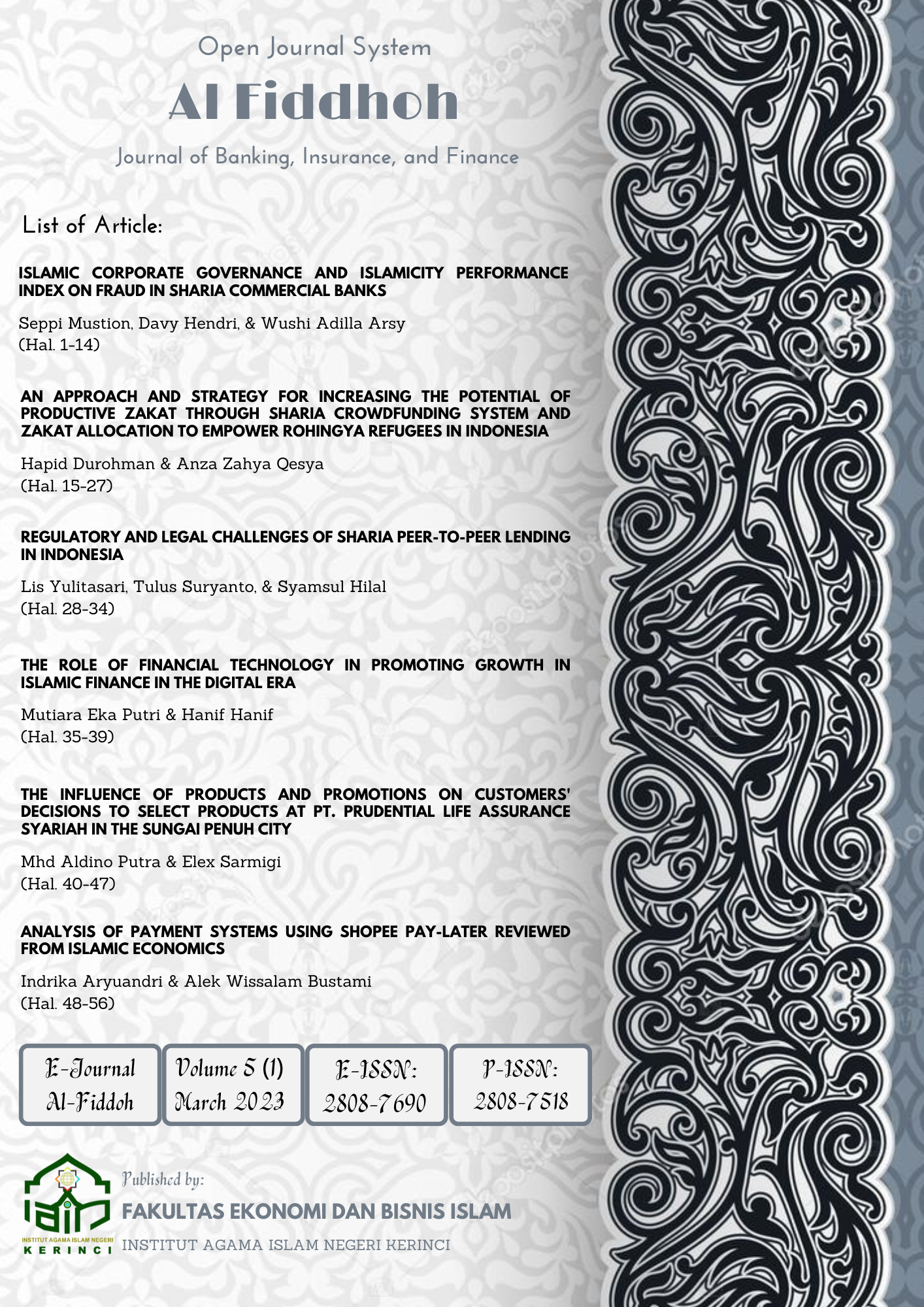AN APPROACH AND STRATEGY FOR INCREASING THE POTENTIAL OF PRODUCTIVE ZAKAT THROUGH SHARIA CROWDFUNDING SYSTEM AND ZAKAT ALLOCATION TO EMPOWER ROHINGYA REFUGEES IN INDONESIA
Abstract
The exodus of Rohingya refugees in Indonesia has occurred since 2009 until today. The Government of Indonesia has made various efforts to help the Rohingya refugees. Zakat funds have been allocated to fulfill the refugees' basic life requirements. This study employs a qualitative approach, utilizing a literature review to explore the role of zakat-system crowdfunding in collecting funds, explicitly concentrating on programs initiated by the National Zakat Agency (BAZNAS) for Rohingya refugees in Indonesia. Secondary data from prior research, diverse sources, journals, books, and the internet form the basis of this investigation, employing the triangulation technique to ensure data reliability. The findings underscore the vital role of zakat as humanitarian aid for Rohingya refugees, contributing to social justice, equilibrium, guarantees, and safety. However, the existing zakat distribution primarily addresses immediate needs, necessitating long-term empowerment programs for the refugees' independence. A proposed model introduces a crowdfunding zakat system, offering a more efficient and transparent approach to collecting and distributing zakat to those in need. Additionally, the study presents an Integrated Zakat and Waqf Model for Refugees (IZWMR), amalgamating institutional and individual donations into a charity pooling fund. This model prioritizes basic needs fulfillment, entrepreneurship training, and microenterprise development, with cash waqf playing a crucial role in subsidizing profit margins and invigorating refugee businesses. Ultimately, these proposed models aim to elevate the welfare of Rohingya refugees in Indonesia, not only providing immediate relief but also empowering them with the tools for self-sufficiency and independence.
Downloads
References
Abdullah, Naziruddin et. al (2015). The effectiveness of zakat in alleviating poverty and inequalities, Humanomics, Vol. 31 Iss 3 pp. 314 – 329.
Abdullah, Prof. Dr. H. Boedi M.Ag., Drs. Beni Ahad Saebani, M.Si (2014). Metode Penelitian Ekonomi Islam (Muamalah), Bandung: CV Pustaka Setia.
Ahmed, B. O., Fuadah Johari, K. A. W. (2017). Identifying people experiencing poverty and the needy among the beneficiaries of zakat: a need for zakat-based poverty threshold in Nigeria, International Journal of Social Economics, Vol. 44 Iss 4 pp. -, http://dx.doi.org/10.1108/IJSE-09- 2015-0234.
Akbar, Syamsul, Baznas Gulirkan Program Pemberdayaan Ekonomi Umat, www.probolinggokab.go.id, 26 Mei 2017.
Al-Faizin, Abdul Wahid dan Nashr Akbar (2018). Tafsir Ekonomi Kontemporer: Menggali Teori Ekonomi dari Ayat-Ayat al-Qur’an, Jakarta:
Andriyanto, I. (2016). Pemberdayaan Zakat Dalam Meningkatkan Kesejahteraan Umat. ZISWAF: Jurnal Zakat Dan Wakaf, 1(2), 1–22.
Arifin, Salahuddin Rijal, dan Wisudanto (2017). Crowdfunding Sebagai Alternatif Pembiayaan Pembangunan Infrastruktur, University Network for Indonesia Infrastructure Development (UNIID 2017), Palembang, 19-20 September 2017. Azhar, Aziz Harry, et. al. (2017). Zakat dan Pemberdayaan, Surabaya: Airlangga University Press.
Ayuniyyah, Q., Pramanik, A. H., Saad, N. M., & Ariffin, M. (2017). The Comparison between Consumption and Production-Based Zakat Distribution Programs for Poverty Alleviation and Income Inequality Reduction. International Journal of Zakat, 2(2), 11–28.
BAZNAS (2022). 2021 Indonesia Zakat Outlook, Jakarta: Center of Strategic Studies The Indonesian Nasional Zakat Board (BAZNAS).
Colombo, M. G., Franzoni, C., & Rossi‐ Lamastra, C. (2015). Internal social capital and the attraction of early contributions in crowdfunding. Entrepreneurship Theory and Practice, 39(1), 75-100.
Gema Insani. Andriyanto, Irsad (2014). Pemberdayaan Zakat Dalam Meningkatkan Kesejahteraan Umat, Jurnal Zakat dan Wakaf, Vol. 1, No. 2, Desember 2014.
Pratisti, S. A., Hidayat, T. K., & Sari, D. S. (2019). When Solidarity is Trampled by Religious Sentiment: Outlining Indonesian Muslim Solidarity toward Rohingya Refugees. In Jurnal Ilmu Sosial dan Ilmu Politik (Vol. 23, Issue 1, pp. 1–13). Universitas Gadjah Mada - Faculty of Social and Political Sciences.
Sarmigi, E., Syukrawati, S., Azhar, A., Desiana, D., & Ramadani, D. F. (2023). Analysis of the Management of Interest-Free Loans by the National Amil Zakat Agency of Sungai Penuh City for the Development of Micro, Small and Medium Enterprises. Jurnal I-Philanthropy: A Research Journal On Management Of Zakat and Waqf, 3(1), 46-55.
Valanciene, L., & Jegeleviciute, S. (2014). Crowdfunding for creating value: stakeholder approach. Procedia Social and Behavioral Sciences, 156, 599-604.
Wisudanto., & Arifin, S.R. (2017). Crowdfunding New Paradigm for Financing: Operational Pattern of Crowdfunding in Indonesia. “Global Conference on Business, Management, and Entrepreneurship. Surabaya, Agustus.”











